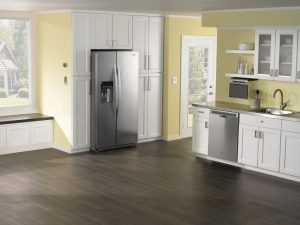Is it Really Broken?
It may seem obvious, but the first thing you need to consider is whether your appliance is actually broken. If you notice an appliance is not working as usual, you may panic and immediately call for a repair technician or even start shopping for a replacement. Fortunately, in many cases, the source of the issue is something simple.
Take a few minutes to perform some basic troubleshooting to determine if there actually is a problem that needs attention. It is remarkably common for many issues to be the result of the appliance no longer receiving power. Something as simple as the power cable becoming unplugged or a circuit breaker being tripped could be why your appliance is not operating.
Pay attention to the details of your home. Is the flooring uneven, which could prevent the appliance from running. Has dust accumulated inside the vents or filters? Many large appliances have safety features that prevent them from operating if excess debris has accumulated and is preventing airflow.
You could even check your owner’s manual. Many manufacturers provide a troubleshooting section in the manual to help you diagnose a potential issue.
The Expected Lifespan
While we would love to think that things are built to last forever, appliances do have a limited lifespan. Even if you have ensured the appliance has had regular care and maintenance, you cannot expand the expected lifespan indefinitely.
Generally, appliances have a typical lifespan:
● Washer: 10 years
● Dryer: 13 Years
● Refrigerator: 13 years
● Garbage disposal: 12 years
● Stove: 13-15 years
● Air conditioner: 15 years
● Water heater: up to 20 years
● Furnace: up to 20 years
While your maintenance schedule and the appliance brand will influence these lifespans, if your appliance is reaching the end of these estimated lifespans, it may be time to consider an upgrade.
Working Out the Age of Your Appliance
If you bought your appliances, you might be able to remember when you made your purchases. It can be a little trickier if you’ve moved into a house complete with appliances. Fortunately, there are a few tricks to work out the age of your appliances to help you determine if they are worth repairing.
Firstly, check for any paperwork. Many sellers will provide owner’s manuals and warranty details to confirm the condition of the appliances and achieve a higher sales price. It is always worth keeping hold of this paperwork, so check if you still have it from when you bought the house.
If you don’t have any paperwork, examine the appliance to find the serial number. Many manufacturers will print a date on the serial number plate. If there is no date, you may be able to perform an internet search on the manufacturer’s website using the serial number. This will let you know what generation of appliance you have and whether it is still supported by the manufacturer.
Is the Appliance Worth Repairing?
While your first instinct may be to attempt a repair, you need to think about the long term costs. There is a general 50 percent rule that can help you to determine if a repair is economically viable or if it would be better to replace a damaged appliance.
For example, if you have a washer that is 7 years old. You can expect an average lifespan for this appliance of 10 years. Since the washer has reached over 50% of its lifespan, you don’t want to pay more than 50% of the cost of a replacement repairing it.
For example, If the estimate for repairing your washer is $600, yet you can buy a new one for $1,000, it is not worth the repair. But, if the repair estimate is $300, it is well within the 50% margin, so it is worthwhile repairing it.
Don’t forget to include how often you have had to repair the appliance into your calculations. While spending $50 here and $100 there may seem cheaper than buying a new appliance, these smaller repair bills can really add up.
Could You Extend the Lifespan With Better Maintenance?
If you want to delay purchasing new appliances, regular maintenance is crucial. Research has shown that regular maintenance has a significant impact on appliance lifespans. Maintenance can not only keep on top of efficiency and performance, but provide an opportunity for preventative maintenance. By replacing worn components before they fail, you can minimize the risk of breakdowns and emergency repairs.
There are many simple maintenance habits that can be easily incorporated into your everyday schedule. For example, cleaning the lint trap after every dryer load and checking the exhaust vent every year.
You’ll also find that cleaning the stovetop of any spills after cooking will not only make cleaning easier, but extend the lifespan of your range. You can even prolong the lifespan of your dishwasher by not overloading it.
Signs Your Appliance Needs Repair:
One of the most difficult issues for many homeowners is recognizing when an appliance actually needs repair. Fortunately, appliances typically give you warning signs that something is not quite right. So, if you are attuned to these signs, you can call in a repair technician and avoid a complete breakdown.
Some of the signs to watch out for include:
● Refrigerators: There is excessive condensation or frost inside the refrigerator, the exterior feels warm, the motor is always running, or your food doesn’t stay cool.
● Dishwashers: It doesn’t drain properly, it doesn’t fully fill with water, it shuts off mid cycle, or there are odd noises.
● Washers: There is water leaking during a cycle, it makes excessive noise or violently shakes.
The key takeaway is that you should know your own appliances, and if they start to behave out of the ordinary, it is a sign there is an underlying issue.
If you’re struggling with appliance issues, you can rely on a professional appliance repair technician to assist you.
